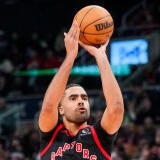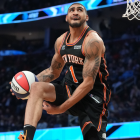Fixing NBA's Slam Dunk Contest: The event can't attract stars anymore, so why not make it a team contest?
If the best dunkers won't dunk four times, let them dunk once

The NBA dealt with a bit of a backlash when it announced that then-G-Leaguer/current Philadelphia 76ers two-way guard Mac McClung would participate in the Slam Dunk Contest. The event takes place at the NBA's All-Star weekend, and McClung wasn't technically an NBA player when he was announced as a competitor. So why is he participating? Well... let's take a look at the three NBA players he'll be competing against. Ignore their meager statistical credentials for a moment and consider their standing within the wider world.
Trey Murphy III, Jericho Sims and KJ Martin have roughly 353,000 combined Instagram followers. That'd be impressive in almost any other context. It's less than half of McClung's 821,000 Instagram followers. The G-Leaguer is more famous than the big-leaguers he's competing against, and as the event is technically called the "AT&T Slam Dunk Contest" with the letters "N," "B" and "A" nowhere to be seen, the league felt it could pull an Air Bud and point out there is technically no rule decreeing that a G-Leaguer can't be in the Dunk Contest. That is how far All-Star Weekend's signature event has fallen.
It didn't use to be this way. Vince Carter won the Dunk Contest. Kobe Bryant won the Dunk Contest. Michael freaking Jordan won the Dunk Contest. Competing used to be a rite of passage for young stars. Genuine rivalries formed. Legends were born. Now? The event is in such dire straits that it is relying on the fame of the Delaware Blue Coats' fourth-leading scorer to generate any buzz. The league didn't have any other choice. Nobody else would show up. Even teenage rookie Shaedon Sharpe had better things to do.
There are plenty of viable explanations for how we reached this point. LeBron James never competed, and he even reneged on a 2009 promise to do so. Once he sat out, every successive up-and-comer knew competing was no longer a prerequisite to stardom. Judge Dwyane Wade shafted Aaron Gordon so badly that Gordon would go on to release a rap song about it, calling the (already flimsy) legitimacy of the event into question. There are a handful of other landmark moments of decline we could point to, but there's a simpler explanation: the dunks aren't fresh anymore.
We've seen every dunk at this point. Jordan jumped from the free-throw line, and in the decades since, there has been no real progress on pushing that line back. Gordon dunked over 7-6 Tacko Fall in 2020. Unless someone miraculously pulls Paul Bunyan out of the stands this weekend, nobody is going to have a taller obstacle to clear. Every angle off the backboard, every variation of through-the-legs, every conceivable prop. In the area of dunking, we have reached the limits of human ingenuity. Asking a player to successfully wow a crowd four times, under those circumstances, is unrealistic and unfair.
But what if we only asked them to do so once? What if we tweaked the format of the Slam Dunk Contest slightly enough to incentivize participation, re-engage the fans and create the illusion of stakes?
Here is my proposal: let's make the Slam Dunk Contest a team event.
Let's clarify: we are not talking about the disastrous East vs. West debacle of 2014. We will instead use multiple players from actual NBA teams to reinvigorate the event. The current format of the contest calls for four dunkers to compete in two rounds. The top two top scorers dunk four times. The two lowest scorers dunk twice. In this variation, four different NBA teams would send four different dunkers to the contest, and each of them would dunk once. Once all 16 dunkers have had their turn, the team with the highest cumulative score would win. The highest individual dunk score would be crowned the individual dunk contest champion, with judges casting tie-breaking votes if necessary.
So what does this tweak accomplish? Several things. The obvious is that it lowers the burden for entry on the superstars we actually want competing. Maybe James doesn't want to spend time and energy coming up with four dunks. Any player of his caliber has one cool idea somewhere in the back of his head. With so many superstars present at All-Star Weekend anyway, convincing a few to dunk once would simply be an easier sell. That is especially true once peer pressure is factored in. It's harder to say no to your teammates, who might actually want to win the dunk contest, than to random fans on Twitter. If that superstar loses? It's less embarrassing because it's part of a team loss. If he shines? There's still an individual trophy for him to take home.
But even when big-name players do compete, the dunk contest still has one fatal flaw that this format change would address. Under the current, four-dunker system, the competitors frequently use their best dunk on their second attempt. Why? Because there's no sense in saving a great idea for the finals if you don't actually make it there. Under this format, there would no final round to wait for. Everybody goes once. The best dunks win regardless of when they happen.
In fact, this actually creates a bit of drama and strategy. Do teams save their best dunks for last? Do they save their most famous dunker for last? Or do you use them right away to try to build a lead? No matter what approach they take, it would be better than the current system that inherently waters down the final dunks.
The added element of team pride adds an entirely new layer of competition to the proceedings. Rivalries could form and even mutate over the course of several seasons. Imagine a player winning with his teammates one year and competing against them as a member of a different team the next. How about two teams who competed in a hard-fought playoff series the previous spring facing off at All-Star Weekend a year later? It could even give fans of bad teams something more to hold onto. "Well, we haven't made it past the second round in 23 years, but at least we've won the dunk contest four times since." I am of course referring to the Knicks.
We still have one obvious question to address here: how do we pick teams? There would obviously need to be some degree of flexibility. Picking all four teams before the season risks ruining the product due to injury or limited interest in participation, so it might make sense to simply reach out to teams individually on a year-by-year basis to gauge interest. The NBA could set up some sort of exemption criteria as well similar to the guidelines the NFL uses to choose a team for HBO's Hard Knocks: teams can decline to participate if they have a new head coach, have made the playoffs in the past two seasons or have been on the show in the past 10 years. The NBA's guidelines would need to be different, but the same principle could apply.
In a perfect world, the host city for All-Star Weekend would either field a team or at least serve as an alternate. The previous team champion should defend its crown, and if one or more of their dunkers are on a new team, putting that team into the field would be preferable. From there, it might come down to how interested a given team or player is in taking part.
This approach doesn't fix the Dunk Contest instantly. Players are ultimately still free to say no. The laws of physics still restrict dunkers. With time, this format might grow as stale as the current iteration. But we've officially reached the point where a G-Leaguer is the event's main attraction. I think we should all be able to acknowledge that something drastic needs to change.


















